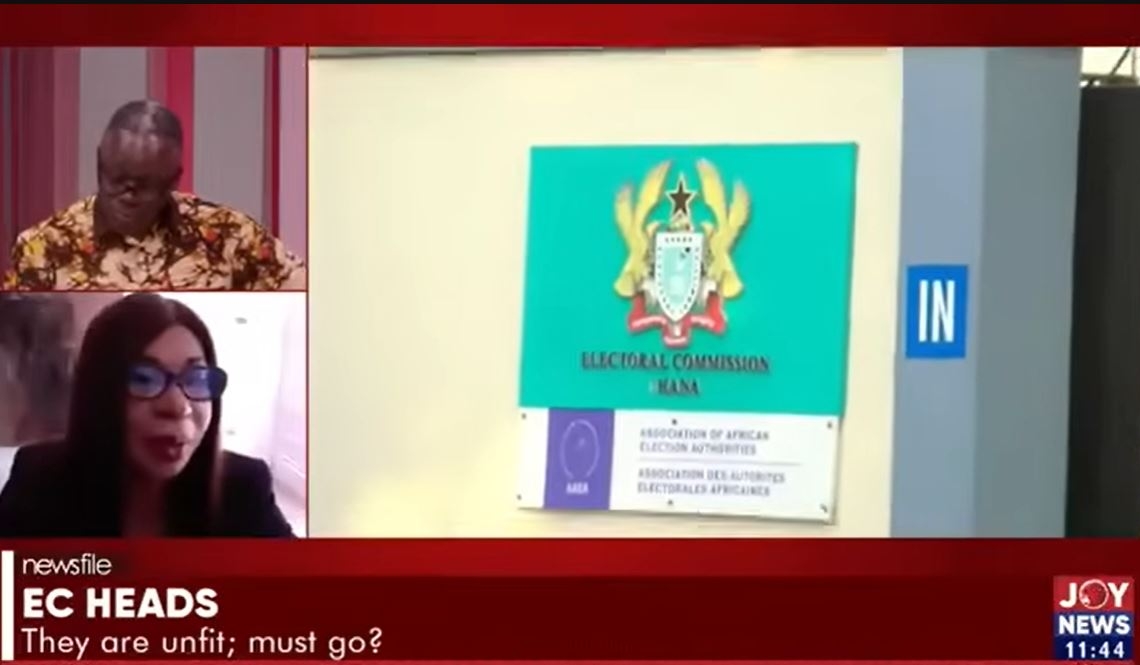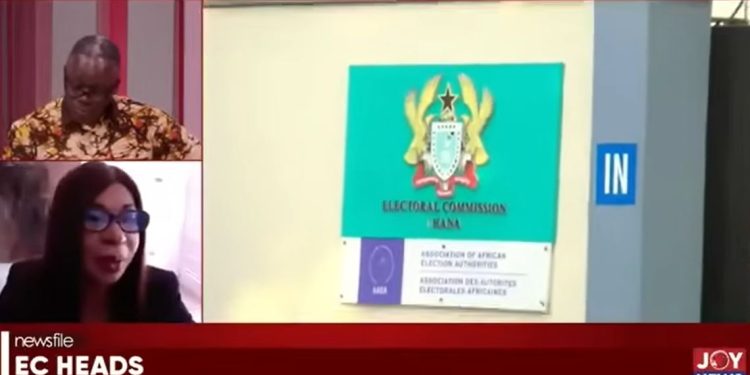
A former advisor to ex-President John Agyekum Kufuor, Vickie Bright, has echoed growing calls for changes at the Electoral Commission (EC), arguing that the perceived political affiliations of some senior EC officials to the New Patriotic Party (NPP) are undermining public trust and the institution’s critical neutrality.
The Deputy Minister of State at the Presidency in the John Agyekum Kufuor administration and a former MP aspirant for the NPP in Okaikoi South made the comment amidst ongoing demands from critics and the opposition National Democratic Congress (NDC), including its National Chairman, Johnson Asiedu Nketia, for a comprehensive overhaul of the election management body.
Speaking on JoyNews’ Newsfile on Saturday, June 28, Ms. Bright, a respected lawyer and entrepreneur, directly addressed the sentiments for a “reset”, defining it as “bringing [the EC] back to an institution that is fit for purpose.”
“I can understand [Asiedu Nketia’s] sentiments,” Bright stated, drawing a comparison to the tenure of former EC Chairman Dr. Kwadwo Afari-Gyan, where, according to her, “we didn’t have any of these incidents and so much hullabaloo and drama.”
[embedded content]She underscored the paramount importance of public trust in any electoral commission.
“It’s important that an electoral commission in any country is respected by all. It’s our electoral commission as Ghanaians, and we need to have the perception of it being competent and neutral… and the neutrality is important,” she stressed.
Ms. Bright, however, noted a significant erosion of this crucial perception under the current EC leadership. “I think over the years, under the tenure of the current leadership, people have begun to question that. So that is clearly a problem.”
She cited specific examples of perceived irregularities and challenges that have plagued recent elections, fuelling public apprehension.
These include constituencies left unrepresented in Parliament for extended periods.
“You have elections that have been conducted with whole constituencies not represented, contrary to our constitution. Every Ghanaian voice is important, and every Ghanaian has to be represented in Parliament,” she lamented. “For four years, I don’t understand for the life of me why for four years SALL went unrepresented. As we speak, we conducted elections six months ago, and Assin North and Fomena have no representation in Parliament at the moment.” She further highlighted ongoing disputes over results in other constituencies like “337 and 62.”
Beyond operational concerns, Ms. Bright zeroed in on the issue of political bias, stating unequivocally, “We know that some of the senior officials of the EC have been affiliated to the opposition party, so that does not help.”
While acknowledging every Ghanaian’s right to political affiliation, she differentiated between private support and active involvement when holding senior public office, particularly in a body demanding absolute impartiality.
“When you’ve been actively involved with one political party and then you’ve been put in this senior position, it actually makes people nervous,” she explained.
Ms. Bright also alluded to other contentious issues that have marred the EC’s image, including “procurement” concerns and the violence during the Ayawaso West Wuogon by-election, which was investigated by the Emile Short Commission.
Despite the EC not being directly responsible for election security, she argued that “certain things that were done… led to some of these things happening.”
In a candid moment on air, when asked to confirm her identity as the lawyer and same former advisor to NPP’s John Kufuor by the host of the show, Samson Lardi Anyenini, Ms. Bright affirmed her stance, declaring, “The law is the law, and I think we have to speak truth to ourselves. And I believe that if things have not gone as they should, we should have the conviction to actually come out and speak the truth.”
Her remarks underscore the deep-seated concerns about the EC’s independence and impartiality, reflecting a broader sentiment among civil society organisations and political stakeholders that a fundamental “reset” is necessary to restore full public confidence in Ghana’s electoral processes ahead of future critical elections.
Her comments also seem to deviate from those of the NPP institution and its allies, as she also strongly defended the independence and actions of the Office of the Special Prosecutor (OSP), asserting that its ongoing investigations into high-profile individuals, including former Finance Minister Ken Ofori-Atta, are in line with its mandate and should not be dismissed as politically motivated.
Some members of the party hold the view that the OSP is simply persecuting Mr Ofori-Atta because of a change in governance.
Mr Ofori-Atta was nominated by former President Nana Akufo-Addo, his paternal cousin, on January 10, 2017 and assumed office on January 27, 2017, as finance minister.
On February 14, 2024, Mr Ofori-Atta was relieved of his position as the finance minister by Nana Akufo-Addo after immense pressure from a section of Ghanaians and a faction within the NPP.
DISCLAIMER: The Views, Comments, Opinions, Contributions and Statements made by Readers and Contributors on this platform do not necessarily represent the views or policy of Multimedia Group Limited.
DISCLAIMER: The Views, Comments, Opinions, Contributions and Statements made by Readers and Contributors on this platform do not necessarily represent the views or policy of Multimedia Group Limited.
- President Commissions 36.5 Million Dollars Hospital In The Tain District
- You Will Not Go Free For Killing An Hard Working MP – Akufo-Addo To MP’s Killer
- I Will Lead You To Victory – Ato Forson Assures NDC Supporters
Visit Our Social Media for More




